

Founder-Ācārya's Excerpts
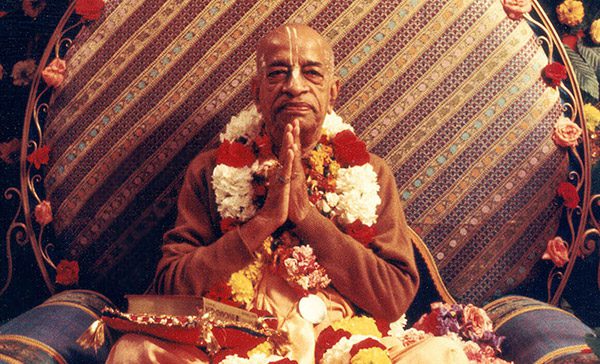
Festival Celebrations
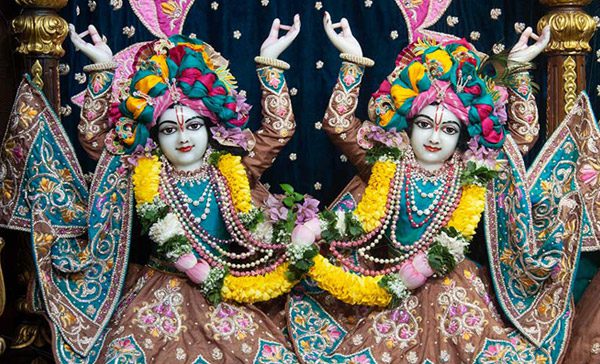
The last festival celebrated without any restrictions was exactly one year ago — Gaura Purnima of 2020 — after which lockdown was imposed all over India. Despite the restrictions this year, the spirit of the festival remained high in everyone’s minds. Throughout the day, devotees kept coming to the temple in queues, took darshan, and left. Their Lordships, Sri Sri Gaura Nitai, received a stunning new set of outfits, and devotees performed hari-nama sankirtan all day. At moonrise — the exact time of Lord Chaitanya Mahaprabhu’s appearance — an abhishek ceremony and janma-vidhi-samskar was performed for their lordships, and the charanamrita was distributed to all the visitors and guests in order to break the day-long fast.
Lectures on Chaitanya-charitamrita and gaura-lila were streamed online. The evening festival lecture online was given by His Holiness Radhanath Swami Maharaja.
No one knows how long the restrictions will remain in place and when devotees will be able to physically assemble in the temple and participate in the devotional activities like they used to do. But one lesson that everyone has learned during this Covid period is this — Krishna consciousness transcends all barriers of time and space, and no material impediment can stop us from glorifying the Yugavatara Sri Chaitanya Mahaprabhu through the yuga-dharma of congregational chanting of the holy names.
Vaiṣṇava Calendar
Upcoming Events
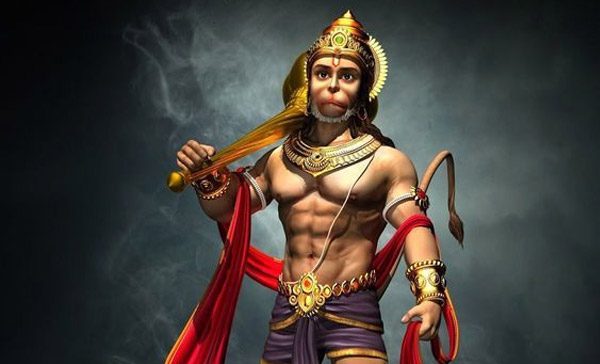
Lord Hanuman is an ardent devotee of Lord Sri Rama and is widely known for his unflinching devotion to Sri Rama. Hanuman is the symbol of strength and energy.
Hanuman is also endowed with many other wonderful qualities, all of which he uses to serve Lord Rama.
It is stated in the scriptures that wherever Rama-Katha, stories about Rama, are recited, Hanuman comes to listen. He makes every endeavor to increase the bliss of Lord Ramachandra’s devotees, both in ancient times and today.
It is also said that the immortal (Chiranjivi) Hanuman has vowed to remain in this world as long as the holy names of Rama are chanted.

Ugadi marks the beginning of a new Hindu lunar calendar with a change in the moon’s orbit. On this day, astrologers make predictions for the coming year. The season is pleasant. New flowers are seen everywhere. The birds sing melodiously. Mangoes are in plenty and are halfway towards ripening.
People pray for their health, wealth, and prosperity. It is also an auspicious time to start new ventures.
The festival is observed with colorful floor decorations called rangoli, a special Gudhi flag (garlanded with flowers, mango, and neem leaves, topped with upturned silver or copper vessel), street processions, dancing, and festive foods.
Traditionally, families prepare a special dish that mixes various flavors, particularly the bitter leaves of the neem tree and sweet jaggery. Additional ingredients include sour tamarind and astringent dhane seeds, is eaten as a reminder of life’s sweet and bitter experiences. All experiences have to be treated with equanimity. Everyone should make a resolve that he will face calmly whatever happens that year, accepting it with good grace. Consider everything for one’s own good.
Long Story Short
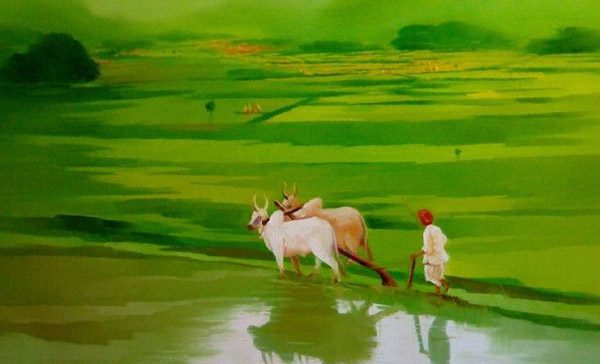
He spurted out many answers; the seed, manure, water, sunlight but it missed what the teacher wanted to hear.
His teacher asked him to walk along with him on the farm and after walking some distance, he placed his arm on his shoulder and told him as a farmer do not lose connection with the soil, your feet meeting the soil is the most important part of farming. The soil will tell you how well it is doing and what it needs.
As we set out daily to produce, we tend to lose connections with people around us, the focus on getting things done eclipses the attention on people who are the soil on which we produce.
People need to be valued and loved; authentic conversations with a child-like curiosity to understand each other and acts of nurturing each other will strengthen the roots of relationships and bear fruits of trust and love.
The more our feet are on the soil the longer and more fulfilling is the walk across.
Our Acharyas
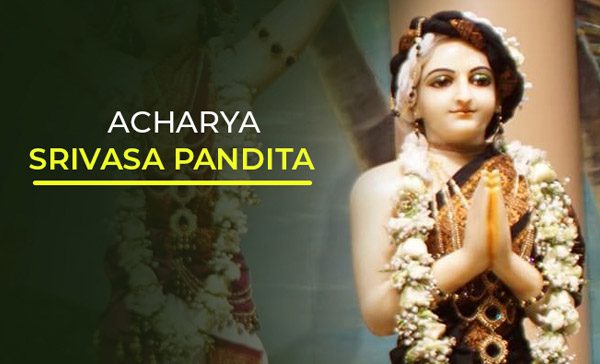
Srivasa leads his brothers Shri Rama, Shri Nidhi, and Shripati in their devotional lives of singing Krishna’s names, worshiping the Lord, and bathing thrice daily in the Ganges. Gaurachandra loved Malini and Shrivasa as second mother and father.
Sri Chaitanya Mahaprabhu’s Mahaprakash Lila, when he sat on the Asan of Lord Vishnu and bestowed benedictions on the devotees, was another of the numerous pastimes that took place in the house of Srivas Pandit.
The divine character of Srivas Pandit is truly remarkable, and an inspiration for all the devotees. Srivasa Pandit maintained his family, not because they were his relatives, but because they were Shri Chaitanya’s loving servants.
Once Mahaprabhu told him that he should do something to maintain himself and his family but he said that he would just chant and wait for a day, if he didn’t get anything to eat he would wait a second day and then the third day and if still, something doesn’t come by Krishna’s mercy then he would give up his life in the Ganges. Seeing his staunch faith in the holy names of the Lord, Mahaprabhu reassured him that he would always be taken care of and he would never have to be concerned about his livelihood. On another occasion, Srivas Pandit’s only son died and all the members of his family were mourning, but in order to not obstruct the kirtan of Mahaprabhu, Srivas Pandit instructs his family to not mourn too loudly. Mahaprabhu, however, found out and pacified the family by bringing back the boy, who said that he was happy in his current situation and didn’t want to return, which pacified the grieving family members.
These incidents depict the greatness of Srivas Pandit, who is none other than Narad Muni, the great devotee of the Lord, who always sings the glories of the Lord while playing on his Vina.
Gifts of the month
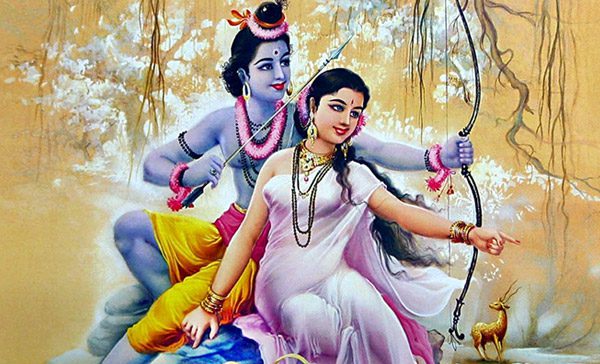
Śloka
~(ŚB 9.10.54)

2 litres milk
2 tbsp lemon juice
1/2 cup sugar
1/4 tsp baking soda
2 tbsp rava
2 tbsp water
1 tsp ghee
Almonds, cashew, raisins
1/4 tsp cardamom powder
METHOD:
- Firstly, in a large vessel boil 2-litre milk on medium flame.
- Once the milk comes to a boil, add in 2 tbsp lemon juice.
- Stir continuously till the milk curdles keeping the flame on low to medium.
- Feel free to add more lemon juice or curd/vinegar to coagulate milk and water separate completely.
- Drain the curdled milk over a cloth-lined colander, rinse off the curdled milk with fresh water to remove sourness from lemon juice.
- Squeeze off the water completely. Do not over squeeze as the moisture in the paneer will be lost, take care to keep the paneer a little moist.
- Take the crumbled paneer into a large mixing bowl, crumble and mash slightly, making sure the texture is uniform.
- Further, add 1/2 cup sugar and 2 tbsp Rava. Mix well until the sugar melts completely. Now add 1/4 tsp baking soda.
- Now add water or as required and prepare a smooth cake batter consistency. Mix for at least 5 minutes, to have a uniform consistency.
- Further, add 1 tsp ghee, badam, cashew, raisins and ¼ tsp cardamom powder. Mix well making sure everything is combined well.
- Now in a small vessel grease with ghee and place a butter paper, transfer the chenna poda batter into the mould and tap twice.
- Bake in a preheated oven at 180-degree celsius for 20 minutes.
Finally, chhena poda is ready to serve or refrigerate for a week in an airtight container.


